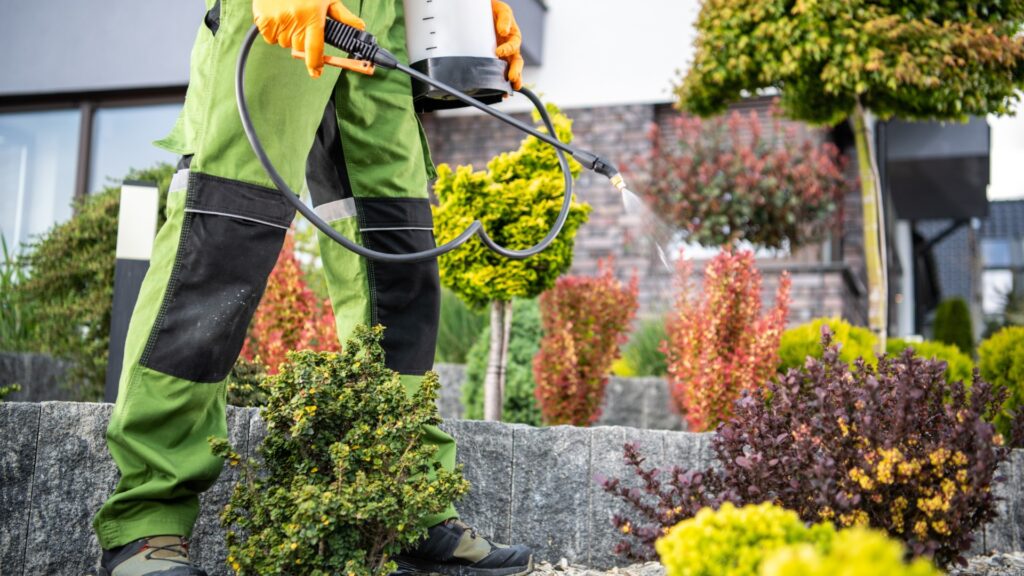
Contents
Ticks and mosquitoes are two of the most persistent and annoying pests that homeowners and property owners must contend with. Mosquitoes and ticks are not only irritating but also leave itchy bites and can transmit diseases that are harmful to humans and animals, leading to serious health issues. So, how often should you spray for mosquitoes and ticks?
Malaria, West Nile virus, and dengue fever are some illnesses mosquitoes transmit. In contrast, ticks can transmit Lyme disease, Rocky Mountain spotted fever and other diseases. Therefore, taking precautions against these pests is essential to protect yourself and your property.
Spraying for mosquitoes and ticks is one way to keep your space free of insects. But how often should you spray for mosquitoes and ticks?
When to Spray for Mosquitoes and Ticks
No one wants to spend their time outdoors swatting insects and scratching bug bites. Spraying for mosquitoes and ticks can reduce the amount of these pests in your outdoor space, making it more pleasant to spend time outdoors.
The best time to spray for mosquitoes and ticks is in late spring and early summer when the temperature begins to rise, and the insects are most active and hatching. Typically, this occurs between May and June in most regions. Additionally, you should spray your property before outdoor events such as barbecues and parties. So, you can enjoy the celebrations without fearing being bitten by these insects.
Nevertheless, depending on the climate and location, you may need to continue spraying throughout the summer and early fall, as mosquitoes and ticks will remain active until the first hard frost if you live in an area with a lengthy mosquito or tick season.
When Should You Spray for Mosquitoes and Ticks?
The frequency of spraying will depend on a number of variables, such as;
Size of Property
The size of the property will significantly affect the frequency of spray treatments. Due to the greater surface area that must be covered, a larger property may require more frequent spraying.
Severity of Infestation
When determining the frequency of spray treatments, it is also important to consider the severity of the mosquito and tick infestation. If the population of these insects is high, more frequent spraying may be required to maintain control.
Type of Spray
The type of spray also influences the frequency of spray applications. Chemical sprays typically require reapplication every four to six weeks, whereas natural sprays may require reapplication more frequently. In contrast, repellent sprays must be reapplied every two to four hours to maintain their effectiveness.
It is important to adhere to the instructions on the product label when determining the frequency of spray treatments. Over-spraying can cause pests to develop resistance, rendering the sprays less effective over time.
Furthermore, different types of sprays may have different instructions for application frequency, so it is crucial to adhere to the instructions for the product you are using.
What Sprays Should You Use?
There are several varieties of sprays to choose from, including:
Chemical Sprays
Chemical sprays contain insecticides that kill mosquitoes and ticks upon contact. They may harm beneficial insects, such as bees, and affect the environment.
Natural Sprays
Natural sprays are made from plant extracts and essential oils. They are less damaging to the environment and have no adverse effect on beneficial insects. However, their effectiveness may not match that of chemical sprays.
Mosquito Repellent Sprays
Mosquito repellent sprays are made from ingredients that repel mosquitoes and ticks, such as DEET and lemon eucalyptus oil. They are effective but may not have the same durability as chemical sprays.
Electronic Devices
Electronic devices such as bug zappers and mosquito traps can be utilized to control mosquitoes and ticks. These devices use a combination of light, heat, and carbon dioxide to attract and kill pests.
Tips for Effective Spraying
To ensure that your spraying efforts are effective, you should keep the following in mind:
- Evenly spray all areas you wish to protect, including plants, outdoor surfaces, and your skin.
- Reapply the repellent as necessary, particularly if you have been outside for an extended period of time.
- When applying the spray, avoid getting it in your eyes, mouth, and lungs.
- Keep the spray in a cool, dry location away from children and animals.
In addition to spraying, there are a number of other ways to control mosquitoes and ticks. Among these techniques are:
Remove Standing Water
Mosquitoes lay their eggs in standing water, so it is important to eliminate any standing water on your property. This can include flowerpots, birdbaths, and gutters.
Keep Doors and Windows Closed
Mosquitoes and ticks can enter your home through doors and windows that are left open. To prevent these pests from entering, it is essential to keep these openings sealed.
Wear Protective Clothing
It is important to wear long-sleeved shirts and pants when spending time outdoors to protect your skin from mosquitoes and ticks.
Use Screens
Screens on windows and doors can assist in preventing mosquitoes and ticks from entering a home.
Protecting yourself and your loved ones from mosquitoes and ticks requires the application of insecticides. It is essential to understand when, how often, and what type of spray to use. Contact Van Den Berge Pest Control at 616-392-7367 to learn more about mosquito and tick prevention. We have been voted the best pest control company in West Michigan eight years in a row and are committed to providing you with the best pest control solutions.
Recent Posts
Effective Ant Extermination Guide for Residential Areas
Eradicate ant infestations in your home effectively. Identify ant movement patterns and nesting locations. Understand
Top 3 Chemical Strategies for Pest Infestation Prevention
You may be hesitant to rely on chemical strategies for pest infestation prevention, fearing potential
Why Choose Chemical Methods for Pest Infestation Prevention?
Are you tired of battling pesky pests that invade your home or garden? Look no
